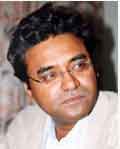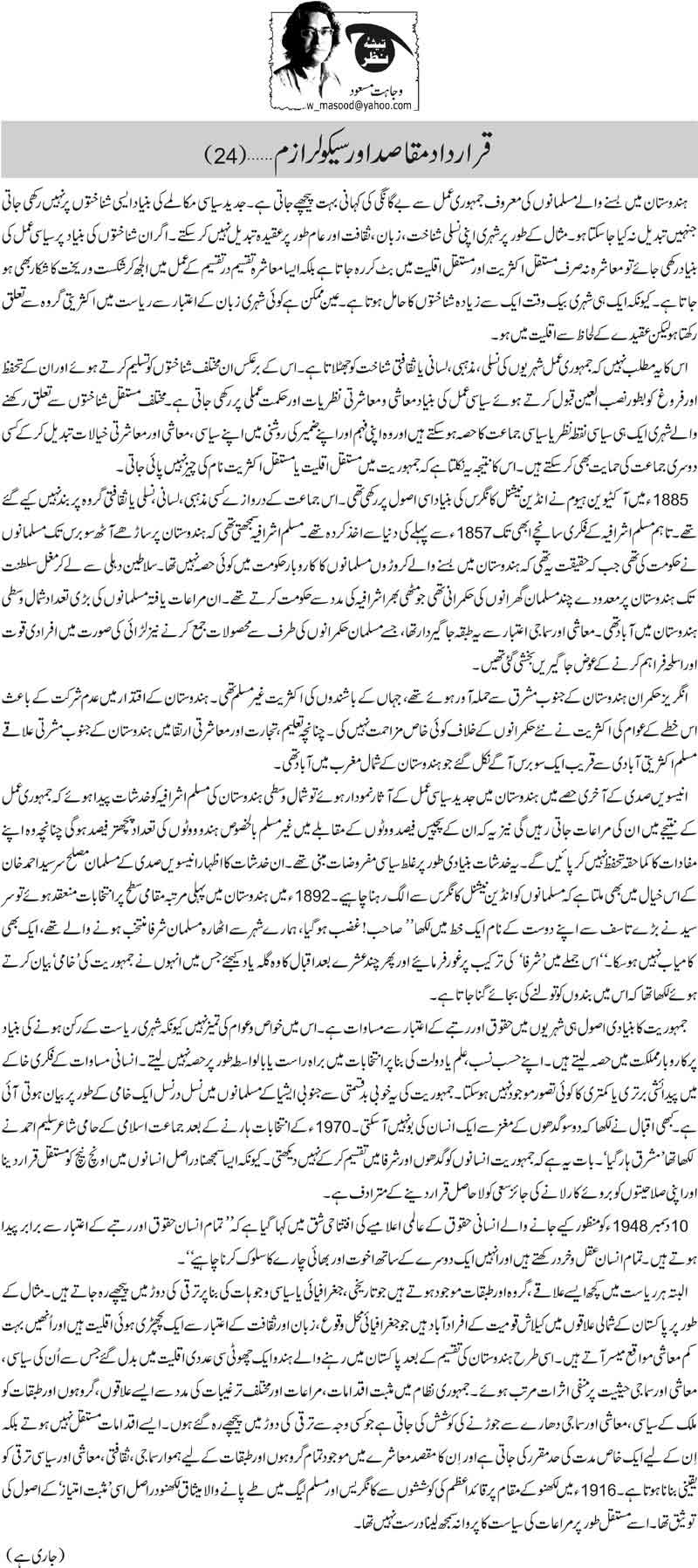
The founder of
Pakistan, Mohammad Ali Jinnah, wanted a separate country for Muslims but his
political upbringing in a pluralist society prevented him from declaring
Pakistan an Islamic state. Contrary to the general perception in India, Mr
Jinnah was arguably a secular and liberal Muslim who wanted a Pakistan where all
citizens would be equal in the eyes of the constitution irrespective of their
religion, caste or creed. But leaders like Liaqat Ali Khan and power hungry
opportunistic religious leaders wanted it to be otherwise. In this beautifully
written series titled, "Objectives Resolution and Secularism", Mr Wajahat Masood
delves deep into history to find out how Jinnah's dream of a secular and
democratic Pakistan was shattered. -- Editor
----
It does not mean the democratic process belies the ethinic, religious,
linguistic and cultural identities of citizens. On the contrary, the foundation
of democratic process is laid on economic and social theories and strategies
while accepting their myriad identities and ensuring their protection and
growth. Citizens having different constant identities can be a part of the same
political ideology or party and can also support a different party by changing
their views acoording to their conscience and understanding. In can therefore be
concluded that in democracy there is nothing like constant majority or constant
minority.
Octavian Hume had founded the Indian National
Congress on the same principle. Its doors had not been closed on any particular
religious, ethnic or linguistic group. Nevertheless, the intellectual mould of the Muslim elite
had been derived from the pre-1857 world. The Muslim elite believed that the
Muslims had ruled India for 850 years whereas the truth is that the million of
Muslims of India had no part to play in the affairs of the government. Right
from the Sultans of Delhi to the Mughal kingdom, a few Muslim clans ruled India
with the help of a handful of elite Muslims. -- Wajahat
Masood 

By Wajahat
Masood
(Translated from Urdu by
Sohail Arshad)
The
story of the alienation of the Muslims in India from the popular democratic
process is vey old. The foundation of modern political discourse is not laid on
such identities that can’t be changed. For instance, citizens cannot change
their ethinic identity, language, culture and generally, their belief. If the
political process is founded on these identities, the society is not only
divided in constant majority and constant minority but also gets stuck in the
vicious cycle of division after division and subsequently such a society
disintegrates because a single citizen
bears more than one identity at a time . It is quite possible that a citizen
belongs to the majority in terms of language but is in the minority in terms of
his belief.
It does
not mean that the democratic process
belies the ethinic, religious, linguistic and cultural identities of citizens.
On the contrary, the foundation of democratic process is laid on economic and
social theories and strategies while accepting their myriad identities and
ensuring their protection and growth. Citizens having different constant
identities can be a part of the same political ideology or party and also
support a different party by changing their views acoording to their conscience
and understanding. It can therefore be concluded that in democracy there is
nothing like constant majority or constant
minority.
Octavian
Hume had founded the Indian National Congress on the same principle. Its doors
had not been closed on any particular religious, ethnic or linguistic group.
Nevertheless, the intellectual mould of
the Muslim elite had been derived from the pre-1857 world. The Muslim elite
believed that the Muslims had ruled India for 850 years whereas the truth is
that the million of Muslims of India had no part to play in the affairs of the
government. Right from the Sultans of Delhi to the Mughal kingdom, a few Muslim
clans ruled India with the help of a handful of elite
Muslims.
A large
number of these privileged Muslims resided in the north-central India. In social
and economic lexicon, this section was called zagirdar who had been conferrd
estates by the Muslim rulers to collect revenues and, in times of war, to
mobilise man-force and arms.
The
English rulers had invaded India from the south-west where the majority of the
inhabitants was non-Muslim. Due to the non-participation of the people of this
region in the government, they put up little resistance against the new rulers.
Therefore the south-western region went ahead of the Muslim majority areas of
the north-west by a century in terms of
education, trade and social growth.
When the
signs of modern political process became evident in India, the Muslim elite
became jittery at the thought that this
process might lead to the loss of their privileges. Moreover, as compared to
their 25% votes, the non-Muslim especially the Hindu votes will be 75%. It will,
therefore, be hard for them to protect
their interests. These apprehensions were based on wrong assumptions. Their apprehensions were evident in the views of the
Muslim reformer of the 19th century Sir Syed Ahmad Khan that Muslims
should keep away from the Indian National Congress.
When the
elections were held on the Local level for the first time in 1892, Sir Syed very
regretfully wrote to a friend, “ Man, it’s unbelievable. In our town, eighteen
Muslim elite were expected to win, but no one was elected.” Let’s consider the
word “elite” in his sentence, then
recall Iqbal’s famous couplet composed decades later complaining that in
democracy men are counted, not weighed.
The
basic principle of democracy is equality among citizens in terms of rights and
status. There is no discrimination between the layman and the elite because the
citizens take part in the affairs of the government as a member of the state.
They do not participate directly or indirectly on the basis of their lineage,
education or wealth. The concept of superiority or inferiority by birth cannot
exist in the intellectual profile of human equality. This merit of democracy,
unfortunately has been considered as a flaw by the Muslims of South Asia for
centuries. Iqbal once wrote that the brains of two hundred donkeys cannot
smell like the brain of a man. After the defeat of the Jamat-e-Islami in
1970, the pro-Jamat poet Saleem Ahmad had written, “ It was the defeat of the
East.” The point is that democracy does not see humans as “elite” or “asses”
because this way of thinking is synonymous with declaring the social differences
among human beings constant or absolute and their efforts to use their
capabilities futile.
The
opening article of the Universal Declaration
Of Human Rights passed on December10, 1948 says:
“All
human beings are born free and equal in dignity and rights. They are endowed
with reason and conscience and should act towards one another in a spirit of
brotherhood.”
Albeit,
in every state there are regions, groups or sections of people that lag behind
in the race for progress due to
historical, geographical or political reasons. For instance, the members
of Kailash community inhabiting the northern areas of Pakistan are a backward
minority in terms of geographical location, language and culture and lack
economic opportunities. Similarly, after the partition of India, the Hindus left
in Pakistan turned into a small numerical minority and it had a negative impact
on their political, social and economic development.
In
democracy, the regions, groups and sects which have lagged behind in progress
for specific reasons are encouraged to join the economic, social and political
mainstream of the country with the help of positive initiatives, benefits and
incentives. These steps are not permanent but time-specific and their purpose is
to ensure a uniform social, cultural, economic and political development for all
the sections and groups of the society.
The
Covenant of Lucknow signed by the Congress and the Muslim League at the
initiative of Qaid-e-Azam in Lucknow in 1916 was in fact, the verification of
the principle of “Positive Discrimination.” It was wrong to consider it a
permanent licensee for the politics of appeasement.





 Sultan Shahin
Sultan Shahin


0 comments:
Post a Comment